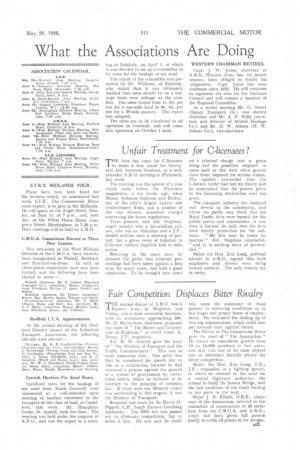Fair Competition Displaces Bitter Rivalry
Page 39

If you've noticed an error in this article please click here to report it so we can fix it.
THE annual dinner of A.R.O. South Eastern Area, at Brighton, last Friday, was a most successful function, with an attendance approaching 209. Mr. D. Richardson, chairman, proposed the toast of " The Mayor and Corporation of Brighton,"to which Coun. E. Denne, J.P., responded.
Aid. H. W. Aldrich gave the toast of " The Ministry of Transport and the Traffic Commissioners." This was in most humorous vein. One point was that he considered his speech due to him as a retribution, because he had ventured a protest against the growth of a system of government by ministerial orders, which he believed to he contrary to the principle of common law. If there were one Ministry which was outstanding in this respect, it was the Ministry of Transport.
Response was made by Sir Henry H. Piggott, C.B., South Eastern Licensing Authority. The 1933 Act was passed not to eliminate competition, but to make it fair. He was sure he could
rely upon the assistance of those present in enforcing conditions as to fair wages and proper hours of employment. He welcomed the linking up of two big organizations, which could now put forward their rightful claims.
The Editor of The .Commercial Motor gave the toast of "The Association." Ife traced its remarkable growth from 10 to 10,000 members in five years, and said that one of its main objects was to substitute friendly rivalry for bitter competition.
Major the Hon. Eric Long, T.D., J.P., responded in a fighting speech, la which he referred to the need for a central highways authority, the refusal to build the Severn Bridge, and the bad condition of the roads leading to our ports in the west.
Major J. B. Elliott, O.BE., chairman of the Association, referred to tbe committee of construction of 20 members from the C.M.U.A. and A.R.O., which had been given full powers finally to settle all points of the merger.




























































































